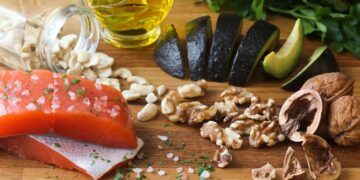 Essential Fatty Acids 101
Essential Fatty Acids 101
Essential fatty acids, or EFAs, are “essential” for one main reason — the human body cannot produce them and they need to be obtained from an outside source, such as food or nutritional supplements. EFAs are the basic elements of our cell membranes and are required for overall good health. Since fats make up at least 60 percent of our brain, omegas are critical for brain development and optimal functioning. This might explain why high-fat diets such as the ketogenic diet are trending, with enthusiasts making claims such as elevated mental alertness, clarity, and concentration.
Good vs. Bad Fats
If you’ve decided to introduce more fat into your diet, remember not all fats are created equal. There are two main types of fats, saturated and unsaturated. Aside from coconut oil, a saturated fat that offers a multitude of health benefits, it’s generally recommended to limit the intake of saturated fats. On the other hand, unsaturated fats either monounsaturated or polyunsaturated are typically encouraged.
Monounsaturated fats, or omega-9 fatty acids, are found in food sources such as almonds and avocados. Extra-virgin olive oil is one of the healthiest sources of omega-9 fatty acids and is relatively easy to add to your diet. Since it should never be heated past its smoke point, it’s best to avoid cooking with it and rather simply drizzle it over steamed veggies or use it in a salad dressing.
The good news is that most people living a healthy lifestyle get more than enough omega-9 fatty acids in their diets. Another EFA that there is no shortage of in the typical North American diet is omega-6. These polyunsaturated fats are commonly found in cooking oils such as safflower, sunflower, corn, and soybean oil. Some health experts believe that the excessive amounts of omega-6s in our diet combined with minimal omega-3s have led to numerous health problems, such as chronic pain, heart disease, and various other inflammatory disorders.
The Lowdown on Omega-3s
There’s no refuting that omega-3 fatty acids are the most important EFA and the one we are most deficient in. Omega-3 fatty acids (polyunsaturated) are divided into ALA (alpha-linolenic acid) and EPA/ DHA (eicosapentaenoic acid/docosahexaenoic acid). ALA is found in flax seeds and walnuts, while the best source of EPA/DHA comes from fish, such as anchovies and sardines. Although fish such as tuna are a staple in many households, these large fish are usually higher in contaminants, such as mercury.
Older, bigger, fatty fish tend to carry more environmental toxins as a result of our polluted waters. My advice? If you love having canned tuna post-workout, be mindful of your intake. EPA/DHA are the two omega-3s that have been extensively studied with remarkable results published in reputable medical journals. These EFAs have been shown to be beneficial when it comes to a wide variety of health conditions.
Why are EFAs Important?
EFAs are often recommended for cardiovascular conditions such as high cholesterol or high blood pressure, chronic pain, and inflammatory skin conditions such as acne. For the last decade, I’ve been recommending EFAs as part of a healthy diet, with a strong focus on omega-3 fatty acids.
EPA/DHA is vital since the human diet has dramatically changed over the last few hundred years. If we look at what our ancestors were eating, their diets were very different than ours are today. The ratio of omega-3 fatty acids to omega-6 fatty acids in the hunter-gatherer diet was relatively equal or about 1:2. Unfortunately, the average modern-day diet is loaded with omega-6 fatty acids, with some reports showing that the average person nowadays is consuming 25 to 30 times more omega-6 fatty acids than omega-3s.
This imbalance produces a harmful divide of EFAs with an unbelievable ratio of 1:30 in many cases. An excess of omega-6 fatty acids promotes inflammation, while a diet rich in omega-3 fatty acids is found to be anti-inflammatory. Many chronic conditions — obesity, diabetes, and cardiovascular disease — develop following years of underlying silent inflammation.
The best advice I give my patients is to reduce processed foods and low-quality vegetable oils such as corn and soy. It’s also a good idea to check with your doctor about a blood test for inflammation called C-reactive protein. In terms of dietary modifications, add these omega-3 rich foods to your regular grocery list: organic eggs, dark green leafy vegetables (collard greens, kale, and spinach), nuts/seeds, and deep water fish such as herring, wild salmon, and mackerel.
Attention, Vegans and Vegetarians!
For vegans or vegetarians, popular choices include flax seeds, hemp seeds, chia seeds, avocados, tofu, walnuts, and ahiflower oil. However, although flax seeds are a good source of omega-3s, fish sources remain superior. That’s because while flax seed oil is a good plant-based option, it contains ALA, not EPA and DHA. Although ALA has many health benefits and we try to include this oil or the raw seeds in our diet, conversion of ALA into EPA and DHA is hugely limited because an important enzyme called delta-5-desaturase is lacking. For this reason, vegetarians and vegans are often not getting adequate amounts of EPA and DHA through their diets alone.
Even those who consume fish, are likely not getting enough omega-3 fatty acids either. The reality is that our waters are heavily polluted, so it is best to limit seafood to three times per week. Some fish contain unsafe amounts of methylmercury, polychlorinated biphenyls (PCBs), dioxins, and other contaminants.
That’s why the safest way to ensure EPA and DHA requirements are met is with a certified, high-quality fish oil supplement that meets or exceeds national and international standards. You’ve likely been instructed by your naturopathic doctor (ND) or nutritionist on how to read nutritional labels on the back of food products. Reading supplement labels is no different. Some fish oil capsules do not provide sufficient omega-3 fatty acids and contain saturated fat along with other fatty acids.
Choosing a concentrated fish oil supplement will provide a higher percentage of EPA and DHA, which are the two EFAs with the most beneficial health effects. A concentrated capsule also reduces the number of capsules needed daily. Whether your ND has advised you to take 1,000 mg or 4,000 mg daily, a concentrated capsule can make your life easier. It’s good news that high-fat diets are gaining popularity, but with so many options out there, deciding which fats to eat and which ones to avoid can be confusing. Thankfully, the human brain is the fattest organ in your body and can help you make the right choice.
Follow us on Facebook.
Follow us on Instagram.
Subscribe to our Youtube channel.


 Essential Fatty Acids 101
Essential Fatty Acids 101













